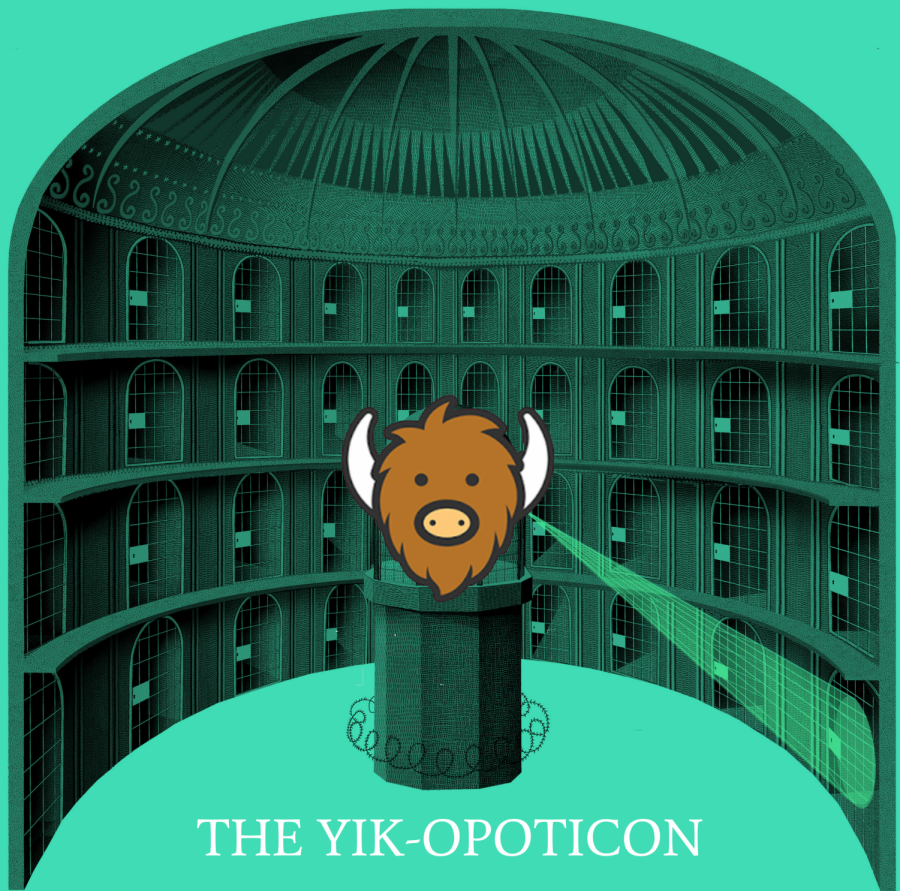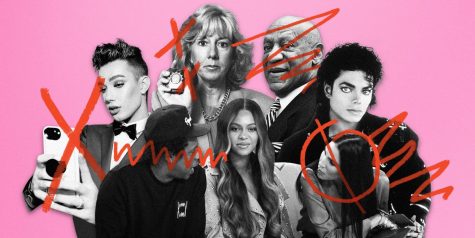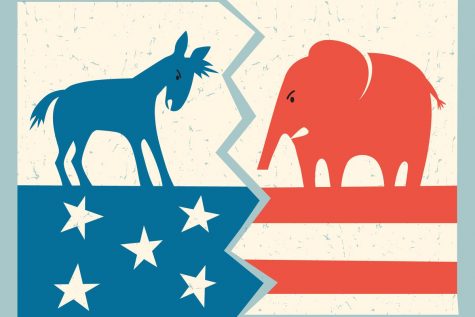The Yik-Opticon
September 16, 2021
“A terrible cesspool.” “Toxic.” “Dangerous.”
These are all words used in various newspaper articles from Fox news to small local university papers to describe YikYak, the revived social media app taking our campus by storm.
YikYak is an app which is basically an anonymous form of Twitter with the up and down vote feature of Reddit. It sounds innocent enough, but has, in the past, been a hub of cyberbullying and harassment, to the point where several colleges have outright banned it–considering it too dangerous and too variable for their communities.
And the Rhodes Administration seems poised to agree with them. In a recent email from Meghan Harte-Weyant, she mentions YikYak, but only as a source of “harassing and deeply harmful” comments. It seems the administration also believes YikYak to be something inherently dangerous and toxic, but is YikYak actually dangerous?
It can be. As an anonymous platform, YikYak runs the risk that every anonymous form does—namely, due to the lack of accountability—many posts reflect the hidden thoughts of the user, which can be discriminatory, insulting, or just plain rude. However, this isn’t always the case. The majority of YIkYak are memes, jokes, and people being horny, which really doesn’t harm anyone. On the average day, the greater risk to my mental stability is the hundreds and hundreds of horny posts I have to scroll through rather than anything overtly rude.
That isn’t to say that YikYak doesn’t have negative effects on its users, it’s just not what we think. YikYak Is a prime producer of something called the Panopticon Effect.
The Panopticon Effect, named for a proposed prison design by Jeremy Bentham, the prisoners are constantly monitored but do not know when or who is doing so. This refers to a situation or platform that causes a person to have a sense of “permanent visibility” (to quote Foucault) and to feel like they are being watched at all hours of the day, much like the prisoners in its namesake, which may sound a lot like paranoia. But the Panopticon Effect distinguishes itself in that instead of just being watched, the watchers in this situation have an ethics code, and if you do not follow that to the letter, you run the risk of real punishment. Whether it be through social ostracization, actual physical retribution, or even just mean comments, you will be punished in some way.
YikYak too punishes those who break the norm, for ill or for good. To break the unwritten rules set by YikYak users is to sentence yourself to a form of social death. You will be written about, made fun of, ridiculed, and, possibly, even in the most extreme cases, stalked and your location broadcasted. You will soon find yourself in a storm of negative critical comments, all piggybacking off of each other, to the point where people dog on you by instinct, barely understanding whatever supposed infraction put you there in the first place.
And this is not, in any way, referring to actual infractions. Racism, sexism, and other real actual issues are things that must always be called out, and calling them out in this way, while sometimes extreme, are often acceptable considering the circumstance. What I am talking about is the random and often arbitrary infractions decided upon by frustrated YikYakers determined to release their anger (without having to be called on it). This list can include: crying loudly, coughing, throwing up (in a restroom), being loud, wearing fancy clothes, walking slower, being quiet, looking sloppy or tired, saying something strange (notably often taken without context), parking (even in the right lot), and my favorite, and the most hypocritical, being too horny.
The problem with this is two-fold. One, it harms and harasses undeserving people, who have done nothing wrong but accidentally violate norms they may not have even been aware of. Two, it causes those who use the app, especially freshmen who have no way of knowing these preconceived norms, to constantly fear being the next victim of this storm of criticism.
And this fear is constant.
The fact of the matter is that when one uses YikYak, much like a prisoner in the panopticon, one never knows when they are being watched, or by who. Your best friend could be the author of the nasty YikYak you saw the other day, the senior passing by you as you study in the library may already be planning a YikYak about you, hell your roommate could be the one posting the Yaks complaining about their terrible and dreadfully annoying roommate. The fact is you never know, and you will never know.
As you can imagine, this causes a significant amount of anxiety and paranoia, which in turn causes one to shift and change their behavior to fit the norms set out. You don’t want to be the one talked about in the next popular YikYak, do you? If not, you should change your behavior, listen and adhere to the moral codes in between the lines of every critical, rude, angry YikYak, and maybe, just maybe, you would be safe.
This idea of safety, however, is an illusion. One can never bet on the ever changing rules of a mercurial crowd. So at one point, there is always a chance that you will be the next on the chopping-block. With your neck constantly hovering under the guillotine it is hard not to be paranoid, not to be afraid and nervous about every strange little action, tick, or habit that one does, that maybe one day will rise the ire of some other faceless user, just waiting to vent their ill-begotten anger at the next best opportunity.
All of this is not to say that YikYak is evil, or inherently bad, or some toxic breeding ground of harassment. For most users, YikYak is a positive experience: it shows them funny relevant jokes, provides support and an outlet for those having bad days, and sometimes is even a source of vital information and advice. However, with every platform comes its faults, and one of the major faults of YikYak is the anxiety it induces among its users, who have to worry about the consequences of violating unwritten rules in an app ruled by mob mentality and the frustrated desires of an anonymous crowd.
















Khulan Erdn • Sep 17, 2021 at 12:08 am
This is such a great piece! Thanks for approaching this issue from such a logical and two-sided perspective.